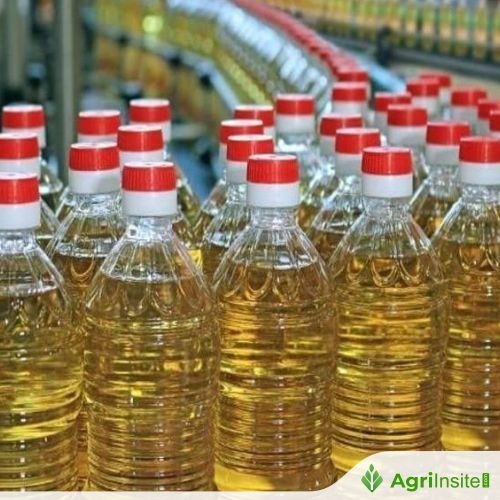India’s duty cut deals a blow to Nepal’s edible oil re-exports

India’s cut in import duties on crude edible oils from 27.5% to 16.5% undermines Nepal’s refined oil re-exports, which had boomed under SAFTA’s duty-free access. The policy favors Indian refiners and exposes Nepal’s minimal-processing trade model. Experts urge Nepal to shift toward domestic oil extraction and value addition for sustainable growth, job creation, and reduced economic vulnerability.
In a significant policy shift aimed at curbing retail prices and protecting domestic refiners, the Indian government has halved the customs duty on crude palm oil, soybean oil, and sunflower oil.
Experts say the move will drastically cut into Nepal’s booming exports of refined edible oils to India, which had surged by taking advantage of duty-free provisions under the South Asia Free Trade Area (SAFTA), a trade agreement among SAARC member states. The revised tariffs have tilted the competitive edge back in favour of Indian refiners.
Effective last Friday, the basic customs duty on these crude oils was lowered to 10 percent from the previous 20 percent. Including the Agriculture Infrastructure and Development Cess, the total import duty now stands at 16.5 percent, down from 27.5 percent earlier. However, the duty on refined edible oils remains unchanged at 32.5 percent, according to Indian media reports.
India had increased the basic import tax on crude and refined edible oils by 20 percent last September to protect local oilseed farmers. That hike had inadvertently benefited Nepali exporters, leading to a sharp rise in soybean oil shipments to India in the months that followed.
India currently imports over 50 percent of its edible oil needs, making it one of the largest importers globally. Nepal, capitalising on this demand, exported Rs90 billion worth of edible oils to India in the first ten months of the current fiscal year ending mid-May.
Most of this consisted of re-exports—processed and packaged oil products that Nepal does not produce in large quantities.
“The Indian government’s reduction of customs duty on crude edible oil is a direct response to the rising refined oil exports from Nepal, which were impacting Indian refiners,” said trade expert Rabi Shankar Sainju. “The new policy reflects India’s intent to promote value addition within its borders, an activity that has increasingly shifted to Nepal in recent years.”
Indian edible oil refineries had been lobbying the Indian government to regulate imports from Nepal and other SAARC nations, alleging that such trade violated rules of origin under bilateral and regional agreements, bypassed Indian regulations, and undermined local farmers and manufacturers.
According to Sainju, Indian refiners can now save 19 percent in costs by importing crude oil instead of refined oil, and so they will prefer to do the processing themselves. He emphasised that much of Nepal’s recent edible oil exports involved minimal processing, often limited to repackaging imported liquid oil for re-export.
“This was creating profits for a few business groups without adding real value or creating jobs within Nepal,” he said. “It neither strengthens the national economy nor represents a sustainable trade model.”
He urged the Nepali government to rethink its trade strategy. “We should focus on promoting the export of goods produced in Nepal or at least ensure substantial value addition before re-export.”
Sainju also warned that if India decides to impose import quotas on edible oil from Nepal, similar to the restrictions placed on vegetable ghee, it could severely discourage such exports. India has been imposing quotas on imports of vegetable ghee, acrylic yarn, copper products and zinc oxide from Nepal since 2002.
“Instead of merely re-exporting, Nepal should consider extracting oil from raw soyabeans domestically. This would create jobs and allow by-products like oil cake to be used in animal feed or export,” said Sainju.
There is also a critical macroeconomic vulnerability: Nepal imports crude edible oil in US dollars but exports the refined version in Indian rupees, exposing the country to exchange rate risks.
The data highlights the magnitude of the recent trade boom. Nepal’s soybean oil exports have surged 90-fold compared to the previous fiscal year. In the ten months alone, Nepal exported 374,086 tonnes of soybean oil worth Rs78.75 billion.
These exports nearly matched the 539,549 tonnes of crude soybean oil Nepal imported at a cost of Rs81.89 billion. Key sources included Argentina, Brazil, China, Iraq, Thailand, and Ukraine, with smaller volumes from Benin, Paraguay, and Togo.
Sunflower oil exports followed a similar trend, increasing 62-fold over the same period. Nepal exported 457,760 tonnes of sunflower oil worth Rs10 billion while importing 166,527 tonnes of crude sunflower oil worth Rs24.64 billion, mainly from Argentina, Ukraine, and Romania.
In case of palm oil, Nepal exported 6,685 tonnes valued at Rs1.16 billion, while importing 32,318 tonnes of crude palm oil worth Rs4.60 billion, chiefly from Indonesia and Thailand, with Malaysia as an additional source.
This rapid expansion in edible oil exports from Nepal to India has sparked concern among Indian oil producers. They argue that the trade takes advantage of loopholes in the South Asian Free Trade Area (SAFTA) agreement and the India-Nepal Trade Treaty, which grant Nepali exports zero-duty access to the Indian market.
In contrast, countries outside the SAARC region must pay a 45 percent duty to export soybean oil to India.
This steep tariff differential has incentivised traders to re-route edible oils through Nepal, taking advantage of duty-free access. While profitable in the short term, experts and policymakers question the legality and sustainability of such a strategy.
According to trade experts, as India moves to reassert control over its edible oil supply chain, Nepal may need to recalibrate its export policy. The challenge now lies in shifting from opportunistic trade practices to a more stable, value-added model that supports long-term industrial and economic development.
To Read more about Edible Oil News continue reading Agriinsite.com
Source : Kathmandu Post
















